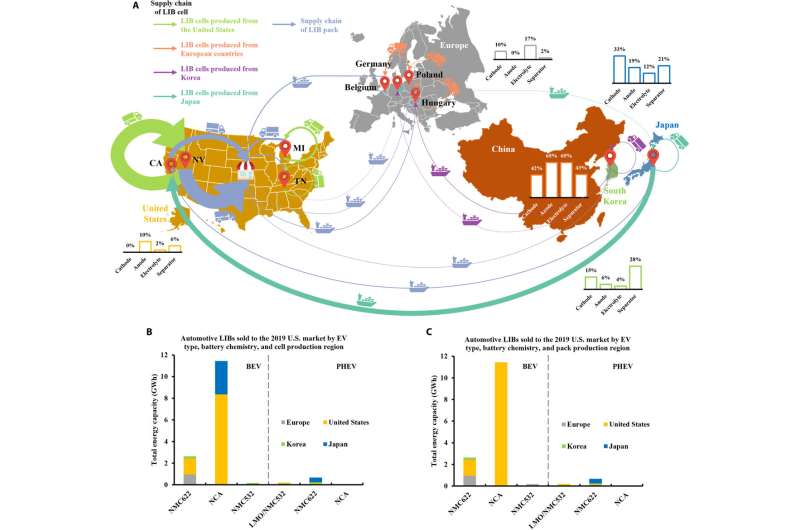This article has been reviewed according to Science X's editorial process and policies. Editors have highlighted the following attributes while ensuring the content's credibility:
fact-checked
peer-reviewed publication
trusted source
proofread
Study unveils policy insights for reshoring EV battery production

With the federal government incentivizing the expansion of domestic electric-vehicle battery manufacturing, a new Cornell University study examines the long-term energy and sustainability prospects of U.S. production, and highlights policy approaches for building a more resilient battery supply chain.
EV batteries are mostly manufactured overseas, and many policy makers want to move more production to the U.S.—a practice known as reshoring—to reduce dependence on foreign imports and unpredictable global supply chains. But reshoring will also have an effect on the country's renewable energy transition and climate goals.
A study published on June 14 in Science Advances provides one of the most comprehensive energy and environmental analyses of reshoring lithium-ion EV batteries, considering the whole life cycle, including raw material acquisition, component production, manufacturing, distribution and transportation.
The study found that reshoring could reduce the overall carbon footprint of U.S. EV batteries and the energy needed to produce them, but that the benefits can swing dramatically based on factors such as advances in technology, supply chain restructuring, and electric vehicle adoption.
"For example, utilizing recycled aluminum and nickel can reduce the carbon footprint by up to 26% for the pre-pandemic U.S. electric vehicle fleet," said the study's co-lead author, Fengqi You, the Roxanne E. and Michael Zak Professor of Energy Systems Engineering and a senior faculty fellow at the Cornell Atkinson Center for Sustainability. "This study highlights the importance of data science and sustainability analytics in informing future policy on energy, climate, manufacturing and the environment."
The study also examined energy and sustainability prospects of an ally-shoring strategy, in which production capacities for refined metals and battery components are reallocated to Japan, South Korean and European Union countries.
Findings from the study include:
- Increasing the shares of onshoring and ally production in the future U.S. EV battery supply chain could reduce the carbon footprint by up to 27% compared to the current supply chain configuration.
- Increasing the shares of renewable energy in the power grid and reducing the reliance on hard coal and lignite-fired electricity would enhance the environmental sustainability of EV batteries.
- A strategic integration of battery technology advancement and supply chain restructuring can result in a 54% improvement in climate change mitigation benefits.
- While reshoring could reduce ecotoxicity and fine particulate matter formation by over 30% from secondary nickel supply, there is a decrease in environmental performances in ozone formation, ozone depletion and ionizing radiation due to increasing overseas transportation distance for materials.
"The type of advanced modeling and systems analysis offered by this study is essential for considering the environmental tradeoffs in how lithium-ion batteries are built," said study co-author Apoorv Lal, a graduate student in You's Process-Energy-Environmental Systems Engineering Lab, "and for securing a resilient midstream and downstream value chain for the U.S. amidst uncertain markets and evolving battery technologies."
More information: Apoorv Lal et al, Will reshoring manufacturing of advanced electric vehicle battery support renewable energy transition and climate targets?, Science Advances (2023). DOI: 10.1126/sciadv.adg6740





















